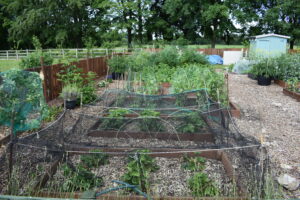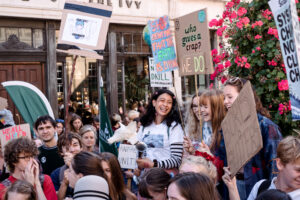How would we know if a university was responding to the climate and ecological emergency? If it was really preparing its students for the environment, economy and society we are likely to see develop over the coming decades? I’d like to think of this question as if university life were a play. This isn’t too big a stretch as a metaphor – university staff and students ‘design’ and ‘write’ the university in all sorts of ways. So, as a play, it would have a scenography, and it would have a script.
As an audience member, the first thing you notice about a play is its scenography. So, in this university that is taking our ecological future seriously, you’d walk around the set and see rich green spaces abuzz with wildlife; energy hyper-efficient buildings and solar panels; zero-waste systems co-designed by staff and students; plant-based, locally sourced meals in canteens; people drinking out of reusable cups and bottles; student food cooperatives doing a busy trade in affordable, healthy food in the Union; car parks repurposed as allotments; furniture being built to last and kept for decades; and abundant cycle parking jammed full of bikes.

YSJ Allotment
Some elements of that scene may be harder to achieve than others, but as a member of the YSJ Staff Education for Sustainable Development (ESD) working group, I have discovered that the university has started to walk the walk on some of these issues. For example, York St John now sends zero waste to landfill, plants native trees on all its sites, and carbon emissions per student have halved in just over a decade. Next on the ‘to-do’ list are the solar panels and green canteens. The plastic continues to be pumped out and there’s little sign of the co-ops yet – so definitely, more set-builders are needed to create the full picture. Yet the scenography is, in many ways, taking shape.
What about the script? That is, the curriculum, both the one written out on programme specifications and the on the ground curriculum that students experience during their years at the university. The script communicates to the audience, the students and the wider community, the drama of how lives play out in this emerging world: what it means to be professional, or to be a citizen, or a theatre-maker, in a society in ecological crisis.
We’re finding in the staff working group that the script is much harder than the scenography. It’s taking longer to write, and it matters just as much – perhaps more. Of course, the two are intimately linked: they tell the story together. The immediate environmental impacts of the campus are important, but the main impact of a university is its students, and the knowledge and experiences they take with them into their long, working, acting, caring lives.
The immediate environmental impacts of the campus are important, but the main impact of a university is its students, and the knowledge and experiences they take with them into their long, working, acting, caring lives.
Many of the students leaving York St John this year will be in their early fifties in the year 2050. Even the more optimistic forecasts predict by then a climate of extreme, unpredictable floods and droughts, fires and storms, and frequent food shortages and pandemics. Seas will keep rising; deserts will keep expanding; economies will keep collapsing. Environmental refugees will flow in ever greater numbers from regions which have become uninhabitable. The poorest will bear the heaviest burden, over and over again. We know this because it’s already started to happen – it just hasn’t hit the UK very hard yet (although the Covid crisis is already part of ecological breakdown, caused by overexploitation of wildlife and exacerbated by poverty)..
It’s hard to look at that picture. Just like with coronavirus, it’s hard to believe drastic changes are really possible, until suddenly they are upon us and we lament our ill-preparedness. But look it square in the face if you can, and ask yourself: what sort of skills and knowledge do students need to have, not just to survive or thrive in that world, but to help others do so? To challenge its injustices, to limit or even reverse the damage to ecosystems, to rebuild societies where both the human and non-human worlds look after each other? That 2050 world will be much harder than this one (which is already no bed of roses), but it will still contain great potential for creativity, care, collaboration, resourcefulness, innovation and radically different ways of organising our societies and politics. In fact, like the Covid-19 crisis, it will draw the best out of many of us.

Climate Strike, York, 2019
So a multidisciplinary research group of staff has been working with the university’s Learning and Teaching Committee to discover what aspects of the script for education at YSJU need to be rewritten, with funding from the Institute for Social Justice. Through our first research phase, in which we held fascinating in-depth focus groups with 23 students from all Schools and year groups, we discovered that students are keenly interested in being involved in this task. Based on the themes these participants identified, we are now commending Phase 2: a series of participatory action research projects to experiment with teaching and learning on ecological justice in four different Schools of the university, with a team of students as co-researchers.
Rewriting the script to promote ecological justice is a task that operates on many levels and across all programmes. On many levels, because it needs a rethinking of everything from programme aims, to module outlines, to learning activities and pedagogies, to research topics, to extracurricular opportunities. Across all programmes, because whether someone is studying sports science, drama, business or education, they will be contributing to leading their communities and workplaces through very difficult times and redefining their profession for those times.
To finish with my drama example, we cannot know exactly what world theatre-makers will be addressing in 2050, or what theatre-making economies and ecologies they will be helping to shape. Perhaps they will be living on Universal Basic Income and making theatre alongside growing vegetables on a community farm, or using drama to help children make sense of their experiences of extreme weather events, or perhaps theatre will have become a more influential mode of communication within political decision-making. In any case, it seems unlikely that their scripts and scenographies will be able to ignore the interdependence between humans and the natural world.
Catherine Heinemeyer is Lecturer in Arts and Environmental Justice at York St John University.


